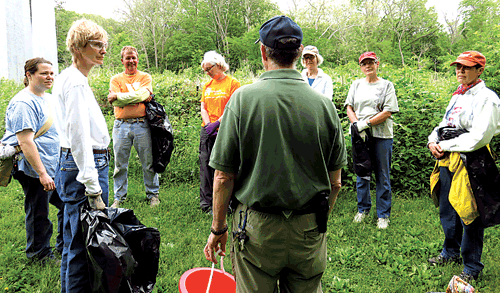NATIVE PLANT GROUP TAKES FIGHT TO LOCAL INVASIVES
 On a recent Saturday morning, a group of nine warriors met to eliminate an enemy. The site: Metea County Park in northern Allen County.
On a recent Saturday morning, a group of nine warriors met to eliminate an enemy. The site: Metea County Park in northern Allen County.
The warriors: Northeast Indiana Native Plant and Wildflower Society (NEINPAWS) (INPAWS).
The target: Garlic Mustard!
INPAWS’ northeast regional chapter became official May 2016 and serves Adams, Allen, DeKalb, Huntington, Noble, Steuben, Wabash, Wells and Whitley counties. Even before the ink was dry on the chapter bylaws, the group started forming committees and making plans. Kate Sanders, whose background is in headwater stream ecology, was nominated to chair the stewardship and plant rescue committee. When the chapter was looking for a stewardship activity, Sanders called Metea County Park.
“This was an opportunity to show the heart of NEINPAWS. Like many natural areas, Metea has been affected by invasive plant species,” says Sanders. “I asked park management, ‘what can we do?’
And the answer came back: garlic mustard.”
Garlic mustard is an invasive, non-native plant that is highly destructive to local habitats. Because garlic mustard completes its lifecycle over two years, the NEINPAWS group attacked not only seed-producing second-year growth but first-year basal rosettes, too.
“It was great to see so many people knowledgeable about invasive plants and willing to do the hard work to remove them,” says Bob Dispenza, park and education manager for Metea County Park. “Metea has had areas covered in garlic mustard that are now clear. Wildflowers are coming back.”
Betsy Yankowiak, director of preserves and programs for Little River Wetlands Project, is the newly elected president for NEINPAWS. She knows the struggle of eradicating invasive species, such as Asian bush honeysuckle, autumn olive, and garlic mustard.
“We’re at a moment where we’re learning how past land management decisions have become detrimental to the Indiana plant community,” says Yankowiak. “The INPAWS name carries credibility. Now we can approach land managers and ask, ‘What are your projects? Can we bring in some people to help?’”
By all accounts, the garlic mustard pull was a success. Sanders believes removing invasives is a crucial form of plant rescue. “We stopped the future spread of hundreds of thousands of garlic mustard seeds in just two hours. Eliminating the bad guys and making room for the good guys frees an entire plant community to thrive again,” says Sanders. “Every bit we pull is a victory for native plants.
- RARE SCHOOL WOODLAND PROPERTY GAINS NEW SUPPORT - April 14, 2017
- AN URBAN PRAIRIE IN WAYNEDALE - January 20, 2017
- RARE INDIANA HABITAT RESTORED, ONE SEED AT A TIME - November 4, 2016


